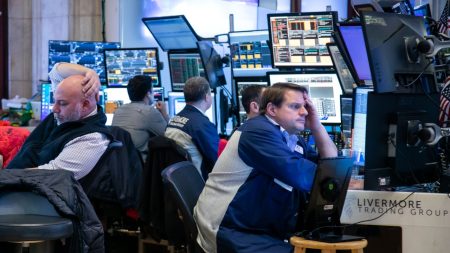Electrical infrastructure stocks like Powell Industries and IES Holdings have been on a tear, leading Forbes’ ranking of mid-sized companies. Right behind are names like Abercrombie & Fitch, Dutch Bros, Sweetgreen and Shake Shack.
By Hank Tucker, Forbes Staff
The growing appreciation of artificial intelligence and anything related to it has been one of the main themes of 2024 for investors, highlighted by Nvidia rising to over $3 trillion in market capitalization, to become the world’s second most valuable company, but the semiconductor designer is far from the only company benefitting from the AI boom.
Houston-based Powell Industries (POWL), the top-ranked stock on Forbes’ annual list of America’s Most Successful Mid-Cap Companies, provides large-scale electrical infrastructure like power control rooms to service job sites. The majority of its $1 billion in annual revenue comes from oil and gas and petrochemical customers, but it has rapidly grown in its “commercial and other industrial markets” segment, which includes data centers, nearly tripling in a two-year span from $57 million in its 2022 fiscal year to $150 million in sales in its 2024 fiscal year ending in September. Companies building AI applications typically require complex and extensive computer systems housed in data centers.
“Sales to data center customers have generally been smaller in scale and focused on individual products—however, as data centers grow in both physical size and computing power, the electrical energy demanded by these facilities will only grow in scale,” chairman and CEO Brett Cope said on its second-quarter earnings call.
Powell’s stock is up 185% this year and more than 600% since the start of 2023, mirroring Nvidia’s rise, and its peers have been similar beneficiaries. IES Holdings (IESC), which generates close to half of its $2.9 billion in annual sales from electrical installations for residential housing, is also a growing player in powering data centers and slots in at No. 2 on our list. Based in Houston and Greenwich, Connecticut, IES CEO Jeffrey Gendell is a hedge fund manager whose firm Tontine Associates acquired a majority stake in the company in 2018. It has proved to be a spectacular investment, with IES shares up tenfold since then, including a 209% gain this year. Gendell’s firm’s stake is now worth some $2.8 billion. Gendell, who took over as CEO in 2020, declined an interview request for this story.
“Microsoft and Google have doubled their power consumption over the last three years,” says Jason Swiatek, head of small and mid cap equity at Jennison Associates. “We’re seeing a very large investment in power generation and transmission through grid hardening, and there are a lot of mid-cap companies that play in that space.”
AI-linked stocks are sprinkled throughout the rest of the list, which screened 731 companies with market capitalizations between $2 billion and $10 billion using data from Factset to rank the top 100. The ranking is based on earnings growth, sales growth, return on equity and total stock return over the last five years, with more weight given to the last 12 months of data. While mid-cap valuations have crept higher in recent years along with the rest of the stock market—the median market cap in the S&P MidCap 400 index is now $7.5 billion, and the largest company in the index is worth $24 billion—this list captures the smaller companies in the mid-cap area of the market.
Much like small-cap stocks, mid-caps have posted strong gains this year but still underperformed relative to large companies. The S&P MidCap 400 is up 18% in 2024, lagging the S&P 500 index of larger stocks by nine percentage points. But over the long term since 2000, the S&P MidCap 400 has trounced both large and small-cap indices, proving to be in the market’s sweet spot with better growth potential than large established companies and more stability and scale than small ones. Mid-caps also responded well to Donald Trump’s victory, surging 4% the day after the election and preserving those gains in the last month.
“Tariffs and some other factors could actually be a tailwind for some of the mid-cap companies, which have more of a domestic focus than international focus,” says Chris Welch, portfolio manager of the $1.2 billion (assets) Diamond Hill Small-Mid Cap Fund. “A lot of companies are saying we want to have more of our production in the U.S., in North America, as opposed to having it in Asia or in other faraway places.”
Honorees on this year’s list of most successful mid-cap companies have generally fared better than their peers, some by a significant margin. Minneapolis-based Sezzle (SEZL), a buy-now, pay-later platform taking on larger competitors like Affirm and Klarna, went public on the Nasdaq in August 2023 following four years on the Australian Stock Exchange and is up a whopping 2,200% in the last year. The standout is No. 3 on the list after its revenue rose 71% to $70 million in the third quarter and posted a healthy profit in each quarter of this year.
The only stock on the list to gain more in value in the last year is GeneDx Holdings (WGS), a genetic testing firm up 3,600% which does exome sequencing to diagnose diseases and help with pediatric care. It is nearing profitability, with a net loss of $8 million in the third quarter after years of much deeper losses, and slots in at 77th on the list.
Another of the top performers is sustainability-focused bitcoin miner Terawulf (WULF), the No. 30 ranked company which announced in October it extended its lease at its hydro-powered Lake Mariner facility on the south shore of Lake Ontario for 35 years. The Western New York site, located where a retired coal plant used to be, is an ideal location for power generation with cool weather and plenty of water. And while bitcoin’s 140% gain in the last year is responsible for some of Terawulf’s fourfold increase, investors are hopeful that it could expand into even more lucrative and profitable applications.
“Some of these bitcoin miners, the value is turning out to be the access to power that they have in their data centers,” says Kevin Cassidy, senior research analyst at Rosenblatt Securities. “Part of the business plan is to bring in HPC (high performance computing), or AI customers.”
Many other names would be recognizable to most consumers. No. 4 Abercrombie & Fitch (ANF) has continued its renaissance with 20% sales growth to $4.8 billion in 12-month sales. Its stock is up another 60% this year and 500% since the start of 2023. West Coast coffee chain Dutch Bros (BROS), founded by billionaire Travis Boersma, and dining staples Shake Shack (SHAK), Sweetgreen (SG) and Cheesecake Factory (CAKE) have all gained market share and bucked the trend of a difficult year for food and drink stocks—Sweetgreen is up 205%.
Some of these high flyers may be nearing a ceiling, but others could be on their way to becoming the megacaps of the future, much like Nvidia a decade ago. Click here to see the rest of our list of America’s Most Successful Mid-Cap Companies.
MORE FROM FORBES
Read the full article here












